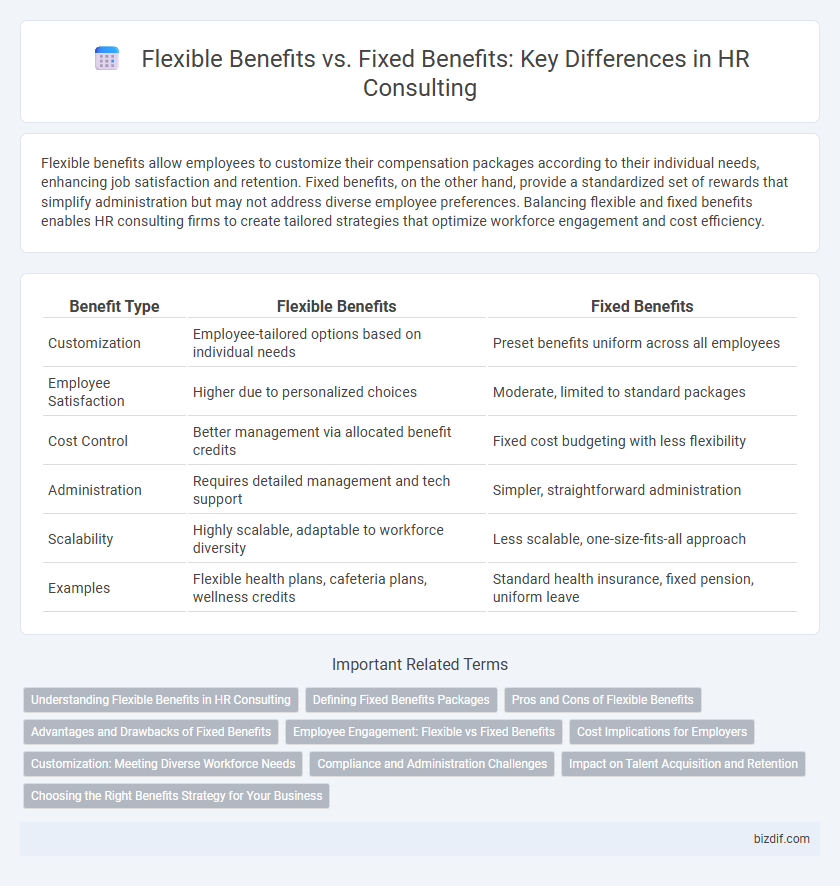Flexible benefits allow employees to customize their compensation packages according to their individual needs, enhancing job satisfaction and retention. Fixed benefits, on the other hand, provide a standardized set of rewards that simplify administration but may not address diverse employee preferences. Balancing flexible and fixed benefits enables HR consulting firms to create tailored strategies that optimize workforce engagement and cost efficiency.
Table of Comparison
| Benefit Type | Flexible Benefits | Fixed Benefits |
|---|---|---|
| Customization | Employee-tailored options based on individual needs | Preset benefits uniform across all employees |
| Employee Satisfaction | Higher due to personalized choices | Moderate, limited to standard packages |
| Cost Control | Better management via allocated benefit credits | Fixed cost budgeting with less flexibility |
| Administration | Requires detailed management and tech support | Simpler, straightforward administration |
| Scalability | Highly scalable, adaptable to workforce diversity | Less scalable, one-size-fits-all approach |
| Examples | Flexible health plans, cafeteria plans, wellness credits | Standard health insurance, fixed pension, uniform leave |
Understanding Flexible Benefits in HR Consulting
Flexible benefits in HR consulting allow employees to customize their compensation packages by selecting from a range of options such as health insurance, retirement plans, and wellness programs, aligning benefits with individual needs. This approach enhances employee satisfaction and retention by providing personalized value, compared to fixed benefits which offer the same standard package to all employees. Implementing flexible benefits requires careful analysis of workforce demographics and cost management to optimize both employee engagement and organizational budget.
Defining Fixed Benefits Packages
Fixed benefits packages consist of predetermined, standardized employee perks such as health insurance, retirement plans, and paid leave, which remain consistent across the organization. These packages simplify budgeting and compliance while ensuring equitable treatment of all employees. Rigidity in fixed benefits can limit personalization but provides predictable costs and streamlined administration for HR consulting firms.
Pros and Cons of Flexible Benefits
Flexible benefits allow employees to tailor their compensation packages to better suit personal needs, enhancing job satisfaction and retention rates. These plans can increase administrative complexity and may result in higher costs for employers compared to fixed benefits. However, flexible benefits improve workforce engagement by offering choices in health insurance, retirement plans, and wellness programs, fostering a more motivated and productive team.
Advantages and Drawbacks of Fixed Benefits
Fixed benefits in HR consulting offer predictability and ease of administration, providing employees with consistent and guaranteed compensation elements such as health insurance and retirement plans. However, fixed benefits lack customization, potentially leading to lower employee satisfaction as these benefits may not align with individual needs or preferences. This rigidity can result in less engagement and reduced perceived value compared to flexible benefits programs that allow personalization.
Employee Engagement: Flexible vs Fixed Benefits
Employee engagement improves significantly when organizations offer flexible benefits, as employees can tailor their rewards to match personal needs and preferences, leading to higher satisfaction and motivation. Fixed benefits often fail to address diverse workforce requirements, resulting in lower perceived value and engagement. Data shows companies with flexible benefits programs report up to 30% higher employee retention and productivity rates compared to those with rigid, fixed benefits.
Cost Implications for Employers
Flexible benefits plans allow employers to tailor compensation packages according to employee preferences, often leading to cost savings by reducing unused benefits expenditures. Fixed benefits require a predetermined budget regardless of individual utilization, potentially increasing overall costs due to lack of customization. Employers adopting flexible benefits can optimize payroll expenses while enhancing employee satisfaction, balancing cost control with competitive offerings.
Customization: Meeting Diverse Workforce Needs
Flexible benefits programs provide tailored options allowing employees to select perks that align with their individual needs, enhancing satisfaction and retention. Fixed benefits offer a uniform package that simplifies administration but may not address diverse workforce preferences effectively. Customization through flexible benefits supports engagement by accommodating varying life stages, health requirements, and personal priorities within the employee population.
Compliance and Administration Challenges
Flexible benefits offer personalized options that align with varying employee needs, but they create complexity in maintaining compliance with evolving labor laws and tax regulations. Fixed benefits simplify administration by providing uniform offerings, reducing the risk of errors and easing reporting requirements. HR consultants must balance the trade-offs between customizable packages and streamlined compliance to design benefit programs that optimize legal adherence and operational efficiency.
Impact on Talent Acquisition and Retention
Flexible benefits empower HR consulting firms to tailor compensation packages, significantly improving talent acquisition by appealing to a diverse workforce with varying needs. Fixed benefits offer predictability but lack the adaptability needed to retain top talent amid evolving employee expectations and competitive markets. Implementing flexible benefits enhances employee engagement and loyalty, crucial for reducing turnover and sustaining a strong talent pipeline.
Choosing the Right Benefits Strategy for Your Business
Choosing the right benefits strategy involves evaluating flexible benefits that allow employees to customize their packages versus fixed benefits that provide consistent, standardized options. Flexible benefits increase employee satisfaction and retention by addressing diverse needs, while fixed benefits simplify administration and ensure cost predictability. Businesses must analyze workforce demographics, budget constraints, and strategic goals to implement a benefits plan that maximizes engagement and operational efficiency.
Flexible benefits vs fixed benefits Infographic

 bizdif.com
bizdif.com